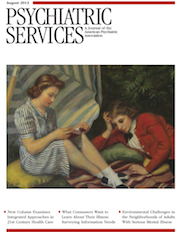Political Engagement as an Element of Social Recovery: A Qualitative Study
Abstract
Objective
Taking a qualitative approach, this study sought to describe consumer attitudes toward political participation and the association between political engagement and social recovery.
Methods
This study used data from seven focus groups of self-identified consumers of mental health services in the New York City area (N=52). Attitudes and behaviors related to voting and other forms of political engagement were identified and classified according to grounded theory, with a focus on the relationship between political engagement and broader social functioning, participation, and recovery.
Results
Participants described the symbolic meaning of voting and political participation in terms of connection to social inclusion versus exclusion. Participants described political participation as a component of empowerment for minority groups in general, including persons who use mental health services and those from racial-ethnic minority groups.
Conclusions
Qualitative studies of the symbolic meanings of political participation are an important component of understanding the broad yet interconnected dimensions of social recovery.



